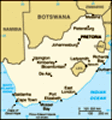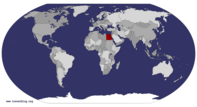Advertisement
Published: November 2nd 2010
SHOOTING UBUNTU
By David Beaumont
Perfect lily, imperfect world. 1/60th, ISO 100, f8 - 1 step, fl 47mm
After a year in the limelight, it’s not news that South Africa offers an amazing diversity of treats for the tourist to enjoy. The country’s crime is an issue which attracts plenty of news, all unwanted. There’s no dispute that the worst crime takes place in the townships, so I was amazed to find out that these over-populated and impoverished shanty towns are open for tourists.
The Big 5, namely lion, leopard, elephant, buffalo and rhino are what this country is otherwise famous for. My personal South African favourite five in no particular order are Cape Town and its environs, Kruger Park, rafting the Orange river, the Karoo and the great value hostelries offering world-class food and lodging nationwide. In their own way, they’ll all pleasantly surprise you.
These are just a taste of what this tantalising nation can put on stage for the tourist to devour. What goes on backstage in this theatre is the essence of the nation, the driving force behind it. Most of the vital labour the country needs to mine the diamonds and
gold, harvest crops, serve tourists, manicure white mans’ gardens or drive the trains and buses, live in townships. These places are referred to locally rather politely as ‘informal settlements.’ To our uninitiated eyes they’re just plain slums.
Having paid the money for an afternoon and night in the townships with photography coach Peter Haarhof with some trepidation, I wonder whether I’ll be pleasantly surprised or just mortified?
When the Nationalist Party’s D.F Malan introduced the infamous the Groups Areas Act in 1950, the process of throwing the black population out of the whites’ cities began. Bulldozers simply demolished row after row of their homes, shops, businesses and schools. Places of worship remained untouched and still stand there today, proud and solitary. In Cape Town, this area was and still is known as District Six. In 2010, the year of the World Cup, it remains empty and untroubled out of respect to its troubled history.
The population fled eastwards from the city, persecuted and on foot, carrying their paltry possessions to the Cape Flats where they rebuilt their existence in the dust from the detritus which surrounded them. They were forced to construct rudimentary homes from drift wood,
scrap metal and cardboard boxes. Electricity and basic sanitation weren’t an issue; they just weren’t. Langa was the first township, followed by Gugulethu and then what is now the largest with an estimated population of a million plus, Khayelitsha, ironically meaning ‘new home.’
The legacy of apartheid remains blossoming and burgeoning to this day.
And so it was that my friend Tim and I awaited the arrival of Cape Photographer Peter Haarhof for our afternoon photographers’ tour of the townships and overnight stay.
Peter’s brand new Land-Rover is heavily branded and sports many examples of his photos from brilliant white bride to proud lion pride. Anonymity will not be the name of the game then. On the way, we stop to collect his fixer. Her name is Precious. I hope she is. She speaks several of the numerous local languages, Xhosa, Sesotho, Zulu and Setswana. Her job is to keep the peace and explain the reason for our visit, hopefully.
After a short briefing from Peter, we pull into Langa and pull over. Thick acrid smoke blown haphazardly by the Cape Doctor (the local name for
the relentless south-easterly wind) envelops the car. Sheeps heads lie liberated in the mud. They call them ‘smilies.’ Local ladies incinerate the fleeces and the eyes are boiled back to the socket. The tool is a simple metal strip which glow when extracted from open fires.
Say cheese. Smilies in the mud. 1/125th, ISO 100, f4. fl 32mm
They sizzle involuntarily in preparation for sale at R30 each, about £3. Precious explains that we are here to take photos and smoothes the waters. It’s morbid. The sheep are beyond suffering whilst the long-suffering sheep searers are genuinely warm and endearing. The smell of burning hair is overpowering and eventually, after a burst of useful tips from Peter we snap away until driven back to the haven of the Land-Rover, unable to hold our breath any longer.
Sheep searer. 1/30th, ISO 100, f8, fl 184mm
We move on around the shacks adorned with expensive cameras and lenses and feeling anything but anonymous.
Over four in ten people here are jobless and seventy per cent are HIV positive. But behind these stark statistics lies an amazing attribute.
It’s called Ubuntu.
In an African version of rock, paper and scissors, Ubuntu would defeat despair and disease every time. Ubuntu means spirit. Their saying goes “a single straw of a broom can be broken easily, but the straws together are not easily broken.” Fierce adversity brings them together with a ferocity that is Ubuntu. All the while, life expectancy is a generation less than ours in Britain.
Peter clicks away while politely barking f-stop, aperture and film speed advice to his pupils but I feel like an intruder. They might be used to shots from a revolver here, but not from a Canon.
We meander further to a shack where Cynthia leans studiously into a window frame. We engage in conversation, chatting easily despite her strong township African drawl.
She was born on 30th July 1966, the day England won the World Cup and since then has had six kids, three of each and is a Grandma several times over. She works as a cleaner in an office in the city. Her monthly income is not much more than £100. By the time she has paid for electricity for her ancient TV and tiny fridge, bought paraffin to provide
meagre heat for her home and paid for her Golden Arrow bus to work, she has less than a pound a day to feed the kids. Six days a week, they eat mealie pap and sour milk. If they’re lucky, they may have enough for meat on Sundays, but fruit and vegetables never bless their table.
She goes on. Her eldest son has just “gone to the bush.” This means that he, at 18, has left the township and now resides in a field by the motorway under a plastic tarpaulin with dozens of other teenagers. Here an unskilled nurse will perform a circumcision on the poor fellow. This is his official Xhosa coming of age. Dozens die from this operation every year as a result of blood poisoning from poor hygiene. They remain there recovering for a couple of weeks after the operation. It is not permitted in this culture to seek medical intervention if things take a turn for the worse. If they do, their manhood is no longer confirmed…let alone intact! Hence the unnecessary fatalities. I had no idea. Despite a feeling that this is brutal, Cynthia is cool and explains that all her boys have
been through the process emerging unscathed.
Her husband is a gardener in Stellenbosch. He rises at 4 to get to work at 7:30, returning in time for a late dinner and bed. It’s an existence. Hope is an aspiration, Ubuntu a drive.
Cynthia. 1/50th, ISO 800, f4, fl 50mm
I humbly volunteer Cynthia the equivalent of a few pounds and she thanks me calling me “Master.” I have learned so much from her, especially humility. “Bless you teacher,” is my response and she laughs. What an amazing woman.
With so many struggling in vain to find employment, the hapless hang around with little to do. Canon fodder and very colourful they are too.
Peter hands them photos he took of them during his last visit a month ago and they are visibly delighted with the results. After posing for me, the victims invariably come running round the back of the camera to examine the digital outcome. Toothy smiles and belly-aching laughter follow. It’s hard to imagine greater hardship and yet a heartier bunch they could not be.
Looking for work in the shadow of Devil’s Peak. 1/50th ISO 100, f22 -
1 step, fl 48mm
After a visit to the local sangoma, a sort of township GP whose cures are all home-made from secret ingredients which would be foreign to most of us, we stumble accidentally into a playground. It’s seen better days. There’s a slide, a see-saw and a roundabout. That’s it. All are so rusty; it’s amazing they still attract the kids. It may be mid-winter here but the indigo sky complements the 20 degree plus temperature and the youngsters need to burn off their excess energy.
As soon as they see the cameras, they wave frantically impeaching us to capture them. They ooze charm and not once do any of them beseech us for free handouts. It’s just not what I unexpected. The reputation of drug gangs, violent crime and child rape to name but a few of the heinous acts undertaken here, is no invention. They are supported by statistics that make unpleasant reading but right now, nothing could be further from my mind.
The only crime here is that of a relatively wealthy but corrupted state being incapable of providing rudimentary education, healthcare, shelter and a decent diet for decent people.
They happily take a break from their game of football, played with a ball made from plastic supermarket bags and string, to oblige my searching lenses.
Ubuntu under the roundabout. 1/160th, ISO 100, f7.1 fl 32mm
The most infectious thing around here is their grins. And the Ubuntu.
As our flash cards fill almost to capacity, the light which is unique in Africa deserts us and, as all photographers know, makes our hobby a sight trickier.
Khayelitsha sunset.1/60th, ISO100, f5 fl50mm tobacco filter
Vicky’s B&B is a small success story in a place where failure abounds. Peter takes us to our place of rest this evening. It was started as a small enterprise in 1999 by Vicky and her husband. This is my third visit in 10 years but the first time I have parted with the R200 you pay for a bed, a hearty hot (ish) chicken and pasta dinner and a simple breakfast. We wave a fond farewell to Peter who has imparted so much useful photographic knowledge to us this afternoon. He will return in the morning for some sunrise photos. As Tim and I sit there enjoying the fruits of our afternoons labour as well as a glass of red wine, we are invited to join Vicky and her team of young and old for evening prayers.
Vicky’s nephew prays. 1/60th, ISO400, f4, fl 90mm
We join in. It’s the least we can do.
To find out more and to book the photographic tour with Peter Harhoff, go to http://www.capephotoco.co.za/ e-mail him on photocoach@mweb.co.za or call him on +27828539939
Advertisement
Tot: 0.096s; Tpl: 0.013s; cc: 9; qc: 50; dbt: 0.0454s; 1; m:domysql w:travelblog (10.17.0.13); sld: 1;
; mem: 1.2mb








